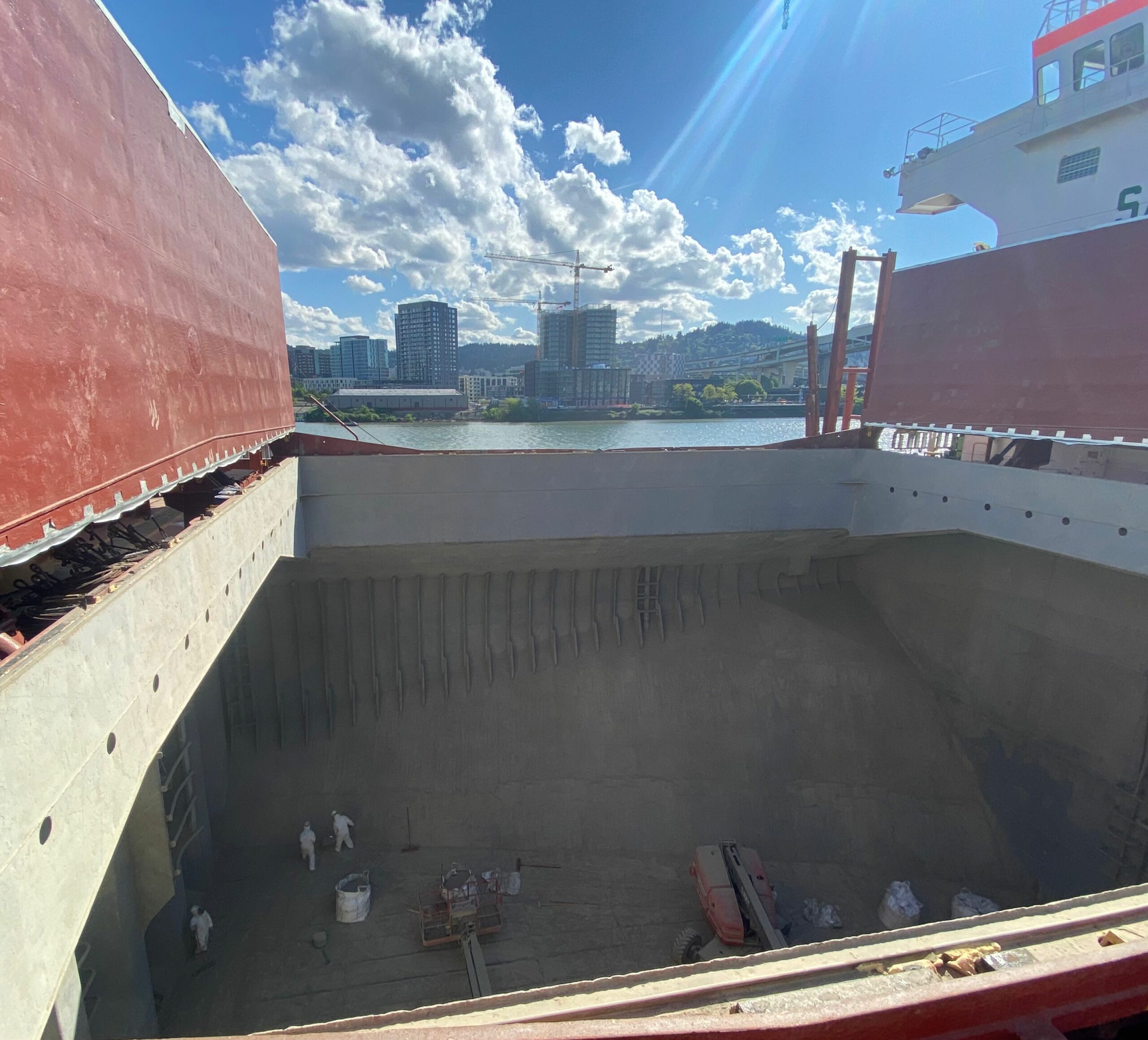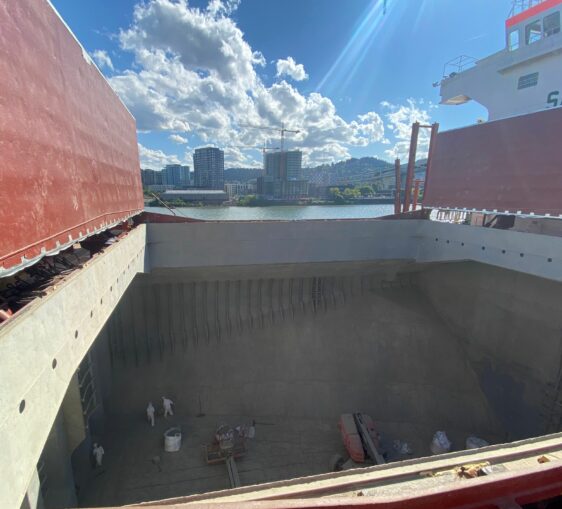

Migrant seafarers work in the pit of a cargo ship, with the financial district of Portland, Oregon, gleaming across the Willamette River, May 23. WW Photo: Danny O'Brien
Portland, Oregon
The writer was part of the delegation that boarded the Otago Harbour ship.
Members of Workers World Party and the Pacific Coast Coalition for Seafarers boarded the Otago Harbour cargo ship on a Central Eastside port in Portland on May 23 to visit with migrant seafarers and deliver 22 care packages of COVID-19 tests, candy bars, ramen, deodorant, toothbrushes and other supplies.


Migrant seafarers work in the pit of a cargo ship, with the financial district of Portland, Oregon, gleaming across the Willamette River, May 23. WW Photo: Danny O’Brien
The Coalition is celebrating its second anniversary this June. It was founded by a grouping of human rights, migrant, labor, faith-based and other community organizations situated along the Pacific Coast to offer solidarity and support for migrant seafarers, whose atrocious working conditions were greatly exacerbated by the COVID-19 pandemic.
When the pandemic hit, crew changes were halted; workers were stranded at sea — and sometimes completely abandoned in foreign waters, despite an increase of profits from the shipping companies — and many had no idea about when they would return home.
In addition to Coalition members making frequent ship visits to bring care packages and give the workers a chance to talk about their conditions, the organization achieved something the $150-billion shipping industry did not — starting a campaign that vaccinated about 4,300 seafarers along the Columbia River in the Pacific Northwest. These vaccinations were given for free, while the shipping companies vehemently refused to vaccinate their workers.
The Otago Harbour, an 18-year-old bulk carrier ship, which sails under the flags of the People’s Republic of China and Hong Kong, was seven months into its journey when it docked in Portland, until it left during the last week of May to continue to British Columbia, Canada, South Korea and Japan.
This ship is owned by Pacific Basic Shipping Ltd., a multimillion-dollar private company based in Hong Kong. The corporation reported the highest earnings and net profits in 2021 in its 34-year history. (pacificbasin.com)
Workers exploited at $2.90 per hour
Seafarers work on an arduous contractual basis and are at sea for many months at a time before they return home for a brief period. A Filipino seafarer can generally make around $500 for a 172-hour work month; some agreements allot $3.80 per hour for overtime work. Most migrant seafarers send a good portion of these wages home to support their families. These wages should be compared to those of U.S. seafarers, who can earn up to $8,000 per month.
WW members talked to a seafarer from Ilollo in the Philippines, who estimated that 80% of the province’s population find work as seafarers. He said that he had welcomed a new baby before starting out on this journey and then had to leave again, just weeks after the birth. His previous voyage lasted 11 months, one of the lengthier trips he had been on in his eight years of seafaring.
Because of these long trips, many seafarers have to miss the birth of their children, as contracts must be taken which provide little rest between voyages. This work often turns into lifelong careers. Despite its unfair pay and unjust working conditions, seafaring is still a relatively safe way for migrant workers to earn steady money to send back to their families. In the Philippines, domestic jobs are not often a viable option, and migrant work like seafaring becomes necessary.
Since the pandemic, these long voyages have not guaranteed these workers any respite through shore leave. COVID-19 restrictions against going ashore are enforced by many countries’ governments. But in the U.S., where shore leave is currently allowed, the shipping companies implement their own restrictions in order to avoid liabilities. Such liabilities could be avoided by simply taking the initiative to vaccinate their workers.
Because of this policy in the U.S., one of the seafarers still retained a traditional mythologized view of this country as some sort of “Land of Opportunity.” He was shocked to hear of the many people experiencing homelessness on our streets and that working people struggle here, too.
Building unity among workers
The working crew members on board the Otago Harbour are mainly from Russia, Ukraine, Bangladesh and the Philippines. But despite their different nationalities and the fact that they must live in close quarters, the seafarers stressed that it benefits all of them to make tight bonds with the workers from different countries.
To overcome the language barrier, English is the official and required language on board. Signs in the hallways and the engine room mandate its use, even though it is not the native language of any of the workers on board.
WW interviewed a member of Migrante, an organization fighting for the rights and welfare of Filipino migrant workers, and for genuine democracy in the Philippines. The group addresses the three root problems in the Philippines: U.S. imperialism, bureaucratic capitalism and feudalism.
Migrante PDX is an active part of the Pacific Coalition for Seafarers, as one-third of these workers come from the Philippines, and the group helped with the Coalition’s vaccination drive and fundraising.
When asked about some of the entrenched, material reasons that Filipinos constitute a majority of the population of migrant workers, Migrante PDX members explained that this development started in the 1970s, under the regime of dictator Ferdinand Marcos. He institutionalized the Labor Export Policy, which has been pushed further by each subsequent Philippine president, and has exponentially forced more and more Filipinos to move abroad to get work.
President Rodrigo Duterte furthered the institutionalization of this policy. He established the Department of Migrant Workers, which will require that more of its budget be allocated for administrative costs, rather than legal and welfare services for Overseas Filipino Workers.
As we left the ship and looked back across the Willamette River, we could see the downtown financial center gleam under the sun. This was in stark contrast to the pit several stories deep in which the seafarers shoveled cement. The class stratification in this view was shocking. This was especially so because the workers on board do not have much of a chance to see the interior of the city they must spend weeks looking at from the outside.
Seafarers are immensely important and essential laborers who shoulder a great burden to do the work they do. Yet the corporations which employ them and the capitalist media cast them into invisibility. The Pacific Coast Coalition for Seafarers strives to make their plight and their conditions visible, and the organization has worked tirelessly to do so since its founding.
Anti-imperialist activists rallied and marched in New York City on July 27 to say “U.S.…
The following is a talk given at a Workers World Party meeting in New York…
Philippine activists and supporters demonstrated July 27 outside the Consulate General of the Philippines in…
The 2025 Belt and Road Journalists Forum in China was an opportunity for Black Agenda…
Download the PDF Opposition to U.S. imperialism grows IOF genocide in Gaza Is internal resistance…
Over 1,500 demonstrators rallied outside Boston City Hall on July 23 to commemorate the 35th…